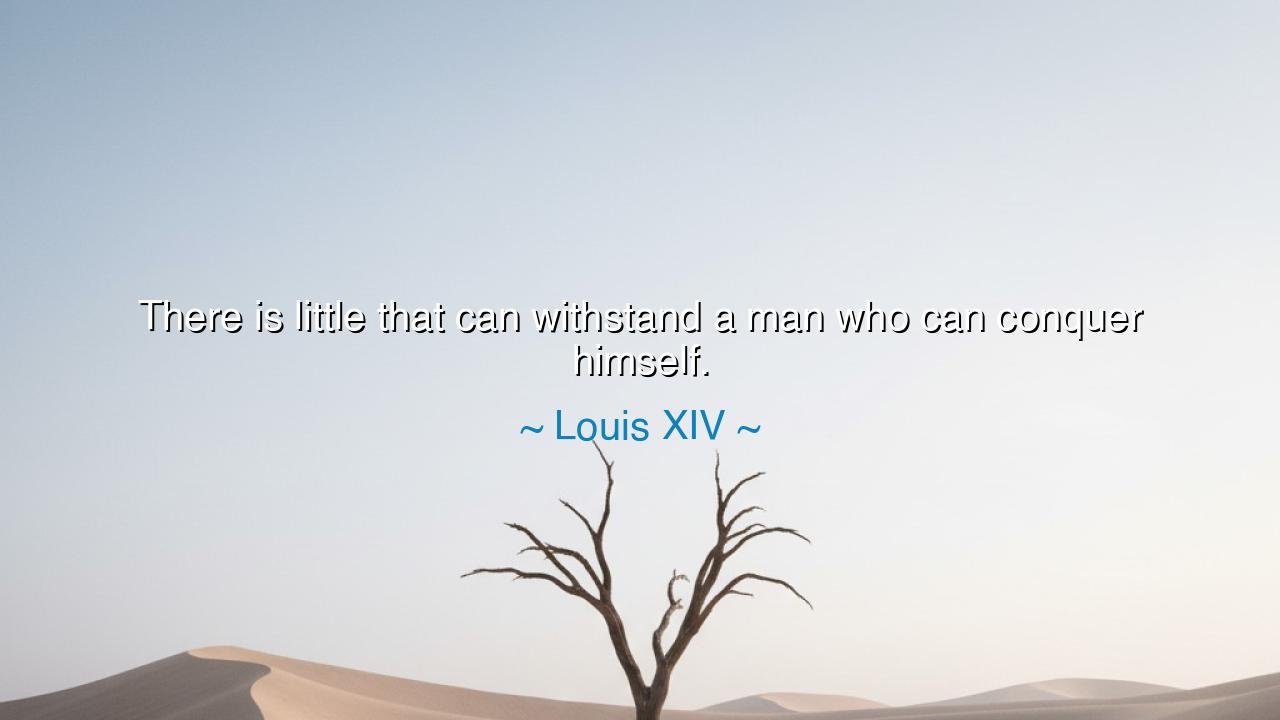
There is little that can withstand a man who can conquer






Louis XIV, the Sun King of France, whose reign dazzled Europe with its grandeur, once declared a truth that echoes louder than all the trumpets of Versailles: “There is little that can withstand a man who can conquer himself.” In these words, he proclaimed the eternal law that the greatest victories are not won upon the battlefield, nor in the courts of kings, but within the secret citadel of the human soul. For to rule others is power, but to rule oneself is mastery. The man who governs his appetites, tempers his anger, restrains his pride, and disciplines his desires becomes unassailable, for no enemy can enslave one who has subdued his own passions.
The ancients, too, understood this. The philosophers of Greece and Rome declared that self-mastery was the highest virtue. Socrates said that the unexamined life is not worth living, for it is only through self-knowledge that a man can direct his steps. Epictetus, the slave-turned-stoic, taught that no tyrant can truly harm the man who has conquered his will. Thus Louis, though clothed in the pomp of monarchy, echoed wisdom older than his crown: that self-conquest is the mightiest conquest.
History offers us shining examples. Consider Alexander the Great, who subdued empires from Greece to India. Yet he who could not conquer his own impulses—his pride, his temper, his excesses—died young, undone not by an enemy, but by himself. Contrast him with Marcus Aurelius, emperor of Rome, who daily fought the battles within: against vanity, despair, and distraction. His Meditations reveal a man who, in conquering himself, ruled an empire with calm strength and left behind wisdom that outlived his armies. Thus we see the truth: kingdoms crumble, but self-mastery endures.
Even in more recent times, the story of Mahatma Gandhi testifies to this power. Frail in body, unarmed, he faced an empire. Yet he had conquered himself—his anger, his desire for vengeance, his fear of suffering. By ruling himself, he became irresistible, and by his self-mastery he moved millions and bent the arc of history toward freedom. His strength was not in force, but in discipline of spirit. He embodied Louis’s words: nothing can withstand the man who has already triumphed within.
To conquer oneself is not to deny passion, but to rule it. Fire can warm or destroy; so too desire, so too anger, so too fear. The unconquered man is like a city without walls, open to every invader. But the self-mastered man is a fortress—storms may rage outside, but within he remains steadfast. His choices are not the playthings of impulse, but the deliberate works of will. Such a man cannot be bribed by pleasure nor broken by pain.
The lesson, then, is luminous: if you would be great, first become ruler of yourself. Train your mind to clarity, your tongue to restraint, your body to discipline, your heart to virtue. The victories of the world are uncertain, but the victory over self is eternal. For kingdoms rise and fall, but the man who conquers himself carries a crown that no thief can steal.
Practical action flows naturally: Begin each day by examining yourself. What passions threaten to rule you? What desires weaken your strength? Wage war upon them with patience and vigilance. Practice silence when anger rises. Practice moderation when pleasure tempts. Practice endurance when hardship presses. Each victory within strengthens your fortress. And in time, you will stand as Louis XIV declared: a man whom little can withstand, for you have conquered the greatest enemy of all—yourself.
Thus, children of tomorrow, take this truth as a commandment: to conquer the self is to hold the key to all other victories. The world bows not to the tyrant of others, but to the king of his own soul.






AAdministratorAdministrator
Welcome, honored guests. Please leave a comment, we will respond soon